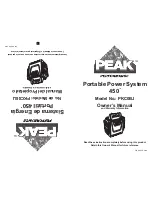
436
TECHNICAL SPECIFICATIONS
Biodiesel Fuel Properties — Low Ambient
Temperatures
Biodiesel fuel may gel or solidify at low ambient
temperatures, which may pose problems for both
storage and operation. Precautions can be
necessary at low ambient temperatures, such as
storing the fuel in a heated building or a heated
storage tank, or using cold temperature additives.
Fuel Quality — Must Comply With ASTM
Standards
The quality of Biodiesel fuel may vary widely. Only
fuel produced by a BQ9000 supplier to the
following specifications may be blended to meet
Biodiesel blend B6 – B20 fuel meeting ASTM
specification D-7467:
Petrodiesel fuel meeting ASTM specification D-975
and Biodiesel fuel (B100) meeting ASTM
specification D-6751
Fuel Oxidation Stability — Must Use Fuel
Within Six Months Of Manufacture
Biodiesel fuel has poor oxidation stability which
can result in long term storage problems. Fuel
produced to approved ASTM standards, if stored
properly, provides for protection against fuel
oxidation for up to six months.
Fuel Water Separation — Must Use
Mopar® Approved Fuel Filter Elements
Biodiesel fuel has a natural affinity to water and
water accelerates microbial growth. Your Mopar®
filtration system is designed to provide adequate
fuel water separation capabilities.
Fuel In Oil Dilution — Must Adhere To
Required Oil Change Interval
Fuel dilution of lubricating oil has been observed
with the use of Biodiesel fuel. Fuel in oil must not
exceed 5%. To ensure this limit is met your oil
change interval must be maintained with in the
suggested schedule. The regular use of biodiesel
between 6% and 20% requires intervals shorter
than the outlined 10,000
miles (16,100
km) and
must not exceed the suggested schedule. When
routinely operating on biodiesel between 6% and
20%, oil and filter replacement intervals must not
exceed 8,000 Miles (12,900
km) or six months,
which ever comes first.
Biodiesel Fuel Filter Change Intervals
The use of biodiesel requires more frequent fuel
filter change intervals. When operating on
biodiesel between 6% and 20%, fuel filter
replacement intervals should be every second oil
change, and must not exceed 16,000
miles
(25,750
km).
NOTE:
Under no circumstances should oil change intervals
exceed 8,000
miles (12,875
km) or six months, if
regular operation occurs with 6% - 20% biodiesel
blends. Under no circumstances should fuel filter
replacement intervals exceed every second oil
change and must not exceed 16,000
miles
(25,750
km), if regular operation occurs with
6% - 20% biodiesel blends. Failure to comply with
these oil change and fuel filter requirements for
vehicles operating on biodiesel blends up to
B20
may result in premature engine wear. Such
wear is not covered by the New Vehicle Limited
Warranty. The engine may suffer severe damage if
operated with concentrations of biodiesel higher
than 20%.
CAUTION!
In the event that the vehicle is filled with
biodiesel and not used for more than a month,
the fuel should either be used up by driving (up
to quarter tank) and filled with standard diesel
blends with less than 5% that is normally
available. This will help prevent the fuel filter
clogging and potential damage to the fuel
injection system due to degraded biodiesel,
which is not covered by the New Vehicle Limited
Warranty.
















































